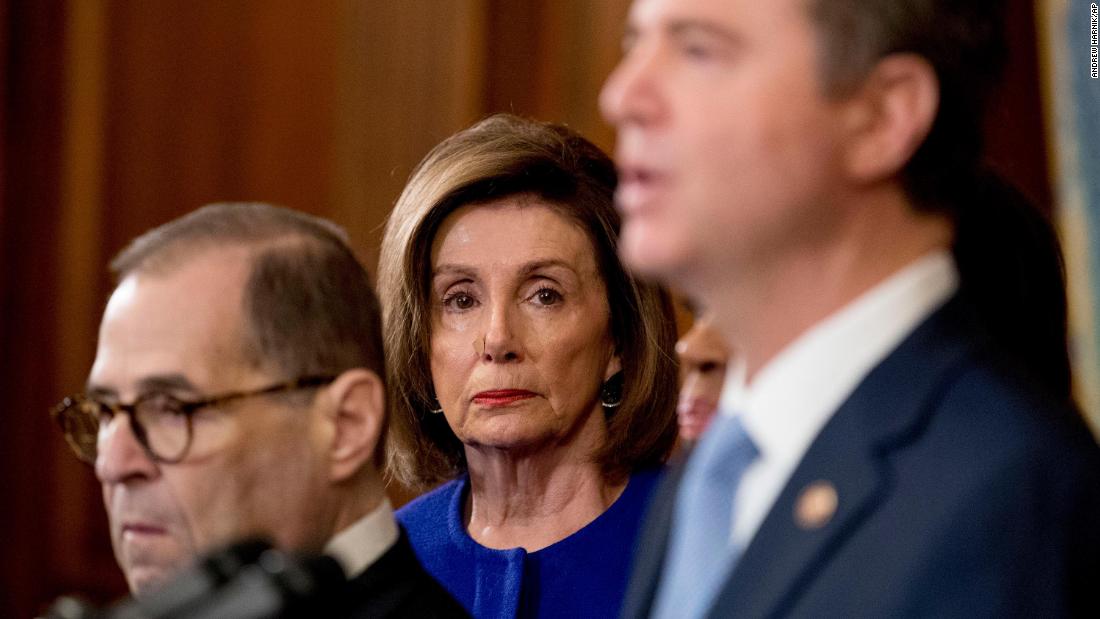
This impeachment process is profoundly different than the ones that have come before.
And many of the differences have to do with the media environment that we're all soaking in.
Many stories and TV segments -- including some on "Reliable Sources" -- have homed in on the similarities between this impeachment and the Nixon and Clinton cases. And there is always value to be gleaned from history.
But the differences are more interesting and more important. This is the first internet impeachment, the first of the smartphone age, and the first with Fox News as a top-rated channel. These screens and social media feeds and cable news screamers are changing the process, and, I'd argue, making it feel smaller, even though it is so big. That's why stories about online behaviors and voter opinions are so vital -- because we get a better sense of how people are processing this moment in American history.
Here are some of the differences this time around, by no means a complete list:
-- Attention spans are shorter and media options are exponentially greater.
-- As Jim Lehrer said on Sunday's "Reliable Sources" broadcast, Trump's impeachment probably has an "even a larger audience" than Nixon's or Clinton's, but most Americans are "using their own prism to watch it," from Fox to PBS.
-- Two words: Social media.
-- As Brian Fung and Donie O'Sullivan wrote last month, an internet impeachment means "out-of-context tweets, internet conspiracy theories and thousands of digital ads."
-- Speaking of tweets, Trump has a Twitter account that he uses to message and massage his base.
-- And Trump has TV defenders that past presidents would only dream of. Look no further than Jeanine Pirro's Saturday night rant alleging the "ugliest, most corrupt attempted political coup in U.S. history."
-- All of this emboldens Trump to say things that Nixon only said in private. On Sunday he claimed that the speaker of the House is losing her teeth and is "crazy." He also suggested the former FBI director should be sent to prison.
-- Other changes are also having an impact. While opinionated forms of media have gained ground in recent years, just-the-facts local sources have struggled.
-- "I think in previous impeachments, we had the sense that everyone involved lived in the same reality. Everybody was on the same planet," Masha Gessen said on "Reliable." But here, "we have been witnessing two non-overlapping realities."
-- All of these factors contribute to a sense of all-consuming polarization.
-- Elizabeth Drew, who covered Watergate, says in this new NYT op-ed that "the impeachment process is barely functioning" this time, and "it's not difficult to envision it breaking down completely."
-- As George Stephanopoulos noted on "This Week," we're heading into a national election "with an impeached president on the ballot for the first time in American history."
Impeachment began with right-wing misinformation
That's what I argued at the top of Sunday's show. The country ended up here, on the brink of impeachment, because of the bogus information Trump was fed about Ukraine and the Bidens. To be clear, Trump is responsible for his own choices, but what he was hearing and reading from right-wing media was crucial. My monologue contains just a few of the many examples.
Lukasiewicz: Conspiracy theories are a 'deliberate deception'
On Sunday's "Reliable," Hofstra comms school dean and former NBC News exec Mark Lukasiewicz argued that the conspiracy theories tied to the Ukraine scandal -- like those promoted by Fox's prime time players -- are really "a disinformation campaign. It's deliberate deception. It's fabrication." He said the media does "a disservice" by repeating the false narratives.
One of my other panelists, Tara Dowdell, said that four "powerful forces" are at play during the Trump impeachment process: Russian disinformation, social media, Fox News, and "the entire Republican party." She said the forces add up to a "disinformation strategy..."
Tapper on "the fundamental decision"
This is how Jake Tapper ended "SOTU" on Sunday: "There has been a glut of information for Americans to consume over the past few months. And not all of it is bad for President Trump. There's Hunter Biden's legal but swampy Burisma contract. Serious and potentially criminal FBI misconduct. But make no mistake: The primary question facing the House of Representatives, and indeed the nation, this week is whether it's acceptable for a U.S. president to use the power of his office to get a foreign government to launch an investigation into a domestic political rival. That's really it. That's the fundamental decision."
Does America have impeachment fatigue?
That's what Oliver Darcy and Ana Cabrera discussed on CNN on Saturday. I think there is definitely some fatigue, and it's partly due to the reasons I listed above.
Another reason is the rise of "savvy" political analysis, which purports to tell people what's going to happen well in advance, making it easier to tune out because people think they already "know" the ending.
As this Michigan voter told NBC, "I don't even care" about impeachment, "it's just noise. "Have you ever recorded a football game, but found out the final score before you watched it? You don't even care. You know what's going to happen."
Except: This "game" is still in its second quarter...
For the record:
-- More than a dozen major paper editorial boards have now called for impeachment, with the NYT joining the list on Sunday. "Many papers backing impeachment have described a slow-building choice," Hannah Knowles writes in this recap for the Washington Post.
-- This weekend's must-read: Elaina Plott's profile of Tucker Carlson for The Atlantic, complete with Carlson claiming that the Potomac River is getting dirtier because of immigrants.
Bagikan Berita Ini














0 Response to "Twitter, Fox News and the other ways in which this impeachment is different"
Post a Comment